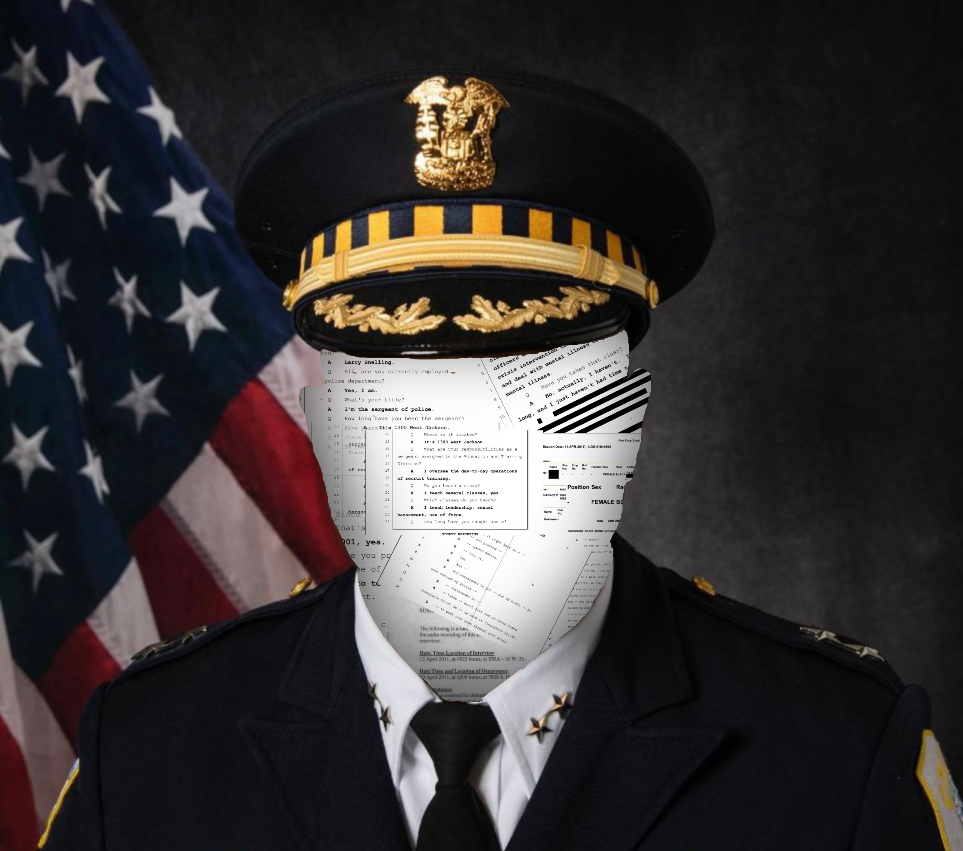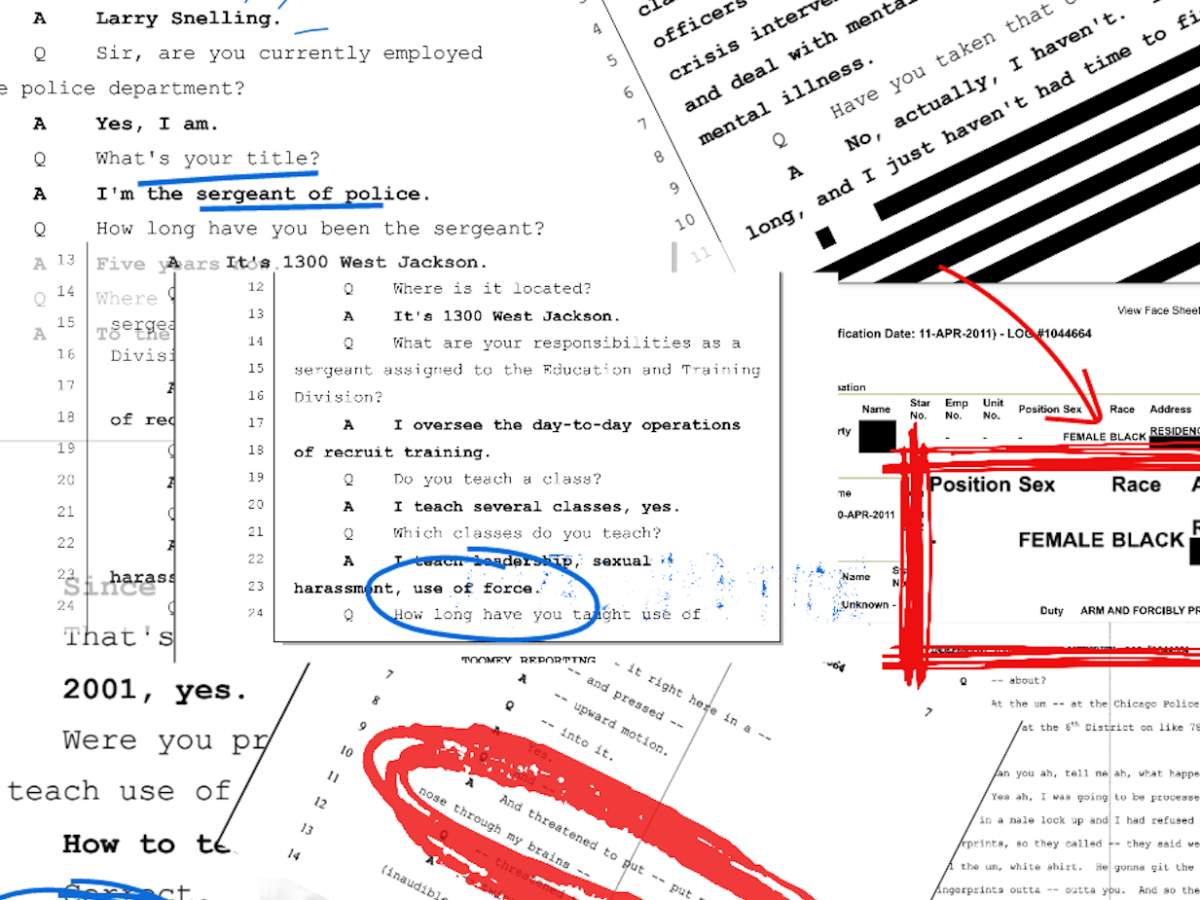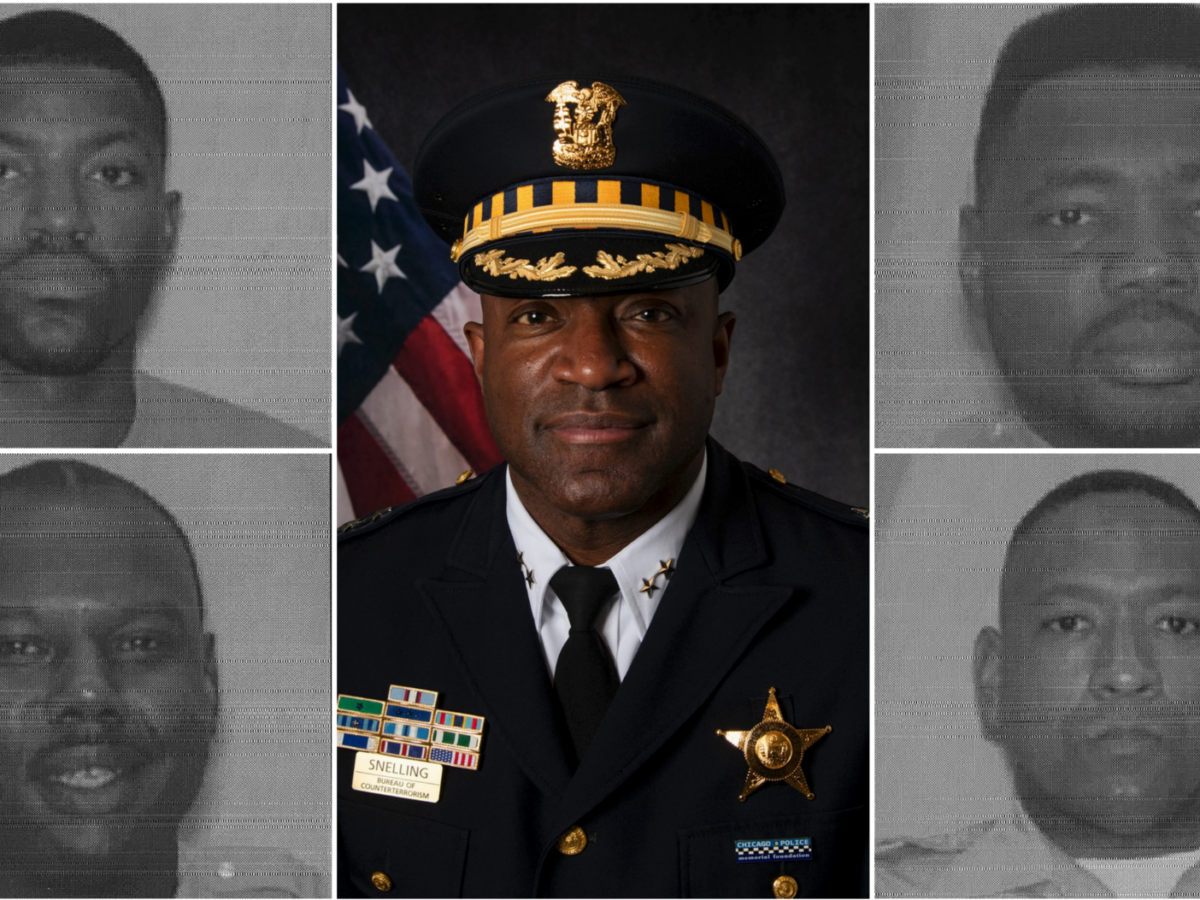As a beat cop in Englewood and Morgan Park in the 1990s, Larry Snelling was the subject of eight excessive force complaints, two of which resulted in suspensions. Some of the allegations describe Snelling slapping or punching people as young as fourteen in the head, while others detail verbal abuse. The allegations describe behavior that, if true, violated long-standing departmental rules that “prohibit all brutality, and physical or verbal maltreatment of any citizen while on or off duty.”
Snelling is Mayor Brandon Johnson’s nominee to be the next superintendent of the Chicago Police Department (CPD). He was shortlisted by the Community Commission on Public Safety and Accountability (CCPSA) after a nationwide search, and has been described as a candidate who is respected by the rank-and-file in the department. Snelling spent much of the last two decades training cops in the department’s use-of-force policy at the police academy. Johnson specifically cited Snelling’s expertise when he announced his pick on August 14, adding that he was confident Snelling would “implement constitutionally driven reforms” like those governing the use of force.
Under CPD’s current use-of-force policy, officers can use force only when it is “objectively reasonable, necessary, and proportional.” Proportionality means that the amount of force an officer uses should have a direct relation to the actions, behaviors, and level of threat exhibited by a person. Officers generally aren’t allowed to strike people who are handcuffed or otherwise restrained. The current policy also requires officers to use de-escalation techniques whenever possible to avoid resorting to force at all.
That policy was updated in 2017, after the 2015 murder of Laquan McDonald by then-officer Jason Van Dyke sparked a comprehensive investigation into the department by the Department of Justice (DOJ). The DOJ identified serious flaws in both CPD’s use-of-force policy and the training officers were getting at the police academy where Snelling worked. The court-ordered consent decree that came out of the DOJ’s findings in 2019 includes pages of provisions specific to the use-of-force policy.
Snelling has been called to testify more than two dozen times as an expert witness on the use of force in cases where officers have been accused of unjustified levels of force. In 2015, he was a witness in the federal trial of Aldo Brown, a CPD officer who was convicted of using excessive force for the brutal beating of a convenience store clerk, and in 2018, he testified in the murder trial of Van Dyke for the killing of McDonald.
The Weekly reported last week that in 2015 Snelling defended the conduct of Glenn Evans, an officer notorious for his brutality, who was accused of using “pain compliance” on a mentally ill woman. Both the Independent Police Review Authority (IPRA) and then-superintendent Eddie Johnson recommended Evans be disciplined in that case.
In all, Snelling received nine excessive force complaints between 1993 and 2000, eight of which occurred within a roughly three-year period. For comparison, during a five-year period between 2015 and 2020 about half of all officers garnered zero complaints at all, and only six percent had more than three complaints in that time period, according to internal audits the Weekly published in 2021.
Snelling was sworn in as a CPD officer in January 1992 at the age of twenty-three. For the next six years, he was assigned to the 7th District, covering Englewood, the neighborhood where he grew up. The detailed investigative reports obtained by the Weekly show a striking pattern of physical violence and verbal abuse allegedly committed by Snelling during his early years with the department.
Last month, the Tribune reported that in 1994, the Office of Professional Standards (OPS) found a complaint that Snelling slapped a person under arrest twice across the face was sustained. The complainant also alleged that Snelling called him a “motherfucker” while he was being transported between police stations for a mugshot. Records obtained by the Weekly revealed that the person was in handcuffs when Snelling slapped him, and that when he advised another person that they didn’t have to answer officers’ questions, Snelling told him to “shut up.” OPS gave Snelling a two-day suspension.
About seven months later, in February 1995, Snelling was accused of using excessive force by two fourteen-year-old Black boys, according to records obtained by the Weekly. One alleged that Snelling “grabbed (him) by the back of the hair and slammed him face down on the concrete,” kicked him in the head, slapped him on the face while he was inside the squad car, and told him to “shut the fuck up,” and to “shut up bitch, your mother sucks dick and eats pussy,” while he was in custody and waiting for his mother to pick him up.
OPS opened an investigation after the mothers of the two boys complained. Multiple witnesses, including the boys themselves and one of their sisters, made consistent, signed statements alleging rough treatment of the two boys by Snelling during the arrest. One of the boys’ injuries were serious enough that he sought medical treatment from Jackson Park Hospital. In the course of their investigation, OPS requested and obtained those medical records for review.
Despite the witness statements and the boy’s medical records documenting his injuries, OPS marked the allegations as “not sustained,” and promptly closed the investigation. In his conclusion, the investigator wrote in justifying the closure, “It would seem that if [he] had been physically abused as he so alleged, he certainly would have sustained injuries of a more serious nature.”
Four months after that, Snelling was accused of brandishing a gun at another driver while off duty, in another complaint first reported by the Tribune. What was not reported by the Tribune, however, was that there were several other passengers in the complainant’s vehicle at the time, all of whom alleged that when Snelling pointed the gun at them, his finger was directly on the trigger. They also alleged that he threatened them to get out of his “hood.” When the driver of the vehicle told Snelling that they were minding their “own business” and that he “should do the same,” Snelling responded, “Motherfucker we will see about your business.”
Snelling admitted having a gun, but denied pulling it from his waistband. He also denied cursing out the other driver. But because the witness accounts were consistent in identifying the type of gun Snelling pointed at them and about his threats—and perhaps because the other driver was an employee of the Cook County Sheriff’s Office—OPS sustained the complaint against Snelling.
He was issued a five-day suspension, even though threatening to harm someone while brandishing a gun is a misdemeanor that can land someone in prison for up to one year.
Records obtained by the Weekly revealed that the person was in handcuffs when Snelling slapped him, and that when he advised another person that they didn’t have to answer officers’ questions, Snelling told him to “shut up.” OPS gave Snelling a two-day suspension.
A year later, Snelling was again investigated for allegations of excessive force. A young man alleged that Snelling struck him “with his fist four times on the head” during an arrest. One of the other officers on the scene, Robert Haile, noted that the young man was not resisting arrest. In the officers’ arrest report citing the young man for disorderly conduct, they made no note of him fighting them or hitting back, only that he had yelled and cursed at them.
The young man also complained that while inside a room at the 7th District police station, Officer Snelling “slapped him once on the face,” resulting in “a small cut on his left eye.” Snelling did not deny using force, only stating that it was “necessary force.” He denied punching the young man in the head or slapping him at the station. Investigators found the complaint not sustained because of a “lack of physical evidence and independent eyewitness accounts of the incidents that could prove or disprove them.”
After racking up seventeen complaints in his first six years in the department, Snelling took a leave of absence from 1998 to 2000 to work as the regional security director for AT&T. After rejoining CPD in 2000, he was assigned to the Education and Training Division as a police instructor, and not to a district station where he’d be patrolling the streets.
Over the rest of his career, he’s received three additional complaints, including one use-of-force complaint in 2000. That was for allegedly getting into a fist fight with a drunk person who’d bumped into Snelling’s parked car. And that was the only complaint that investigators determined that the allegations against Snelling were unfounded and exonerated him for, meaning there was evidence that one of the allegations wasn’t based on facts or did not occur and for the other that he acted in accordance with police policy.
The other finalist for superintendent from within the department, Angel Novalez, has a single excessive force complaint made against him in his twenty-one-year career on the force, according to the Citizens Police Data Project, and just six complaints overall. Semifinalist Ernest Cato III, who did not make the CCPSA’s shortlist, has three excessive force complaints. And neither was implicated in any kind of corruption sting as Snelling was in 1997.
The CPD’s press office did not respond to the Weekly’s questions about the allegations against Snelling.
Before Snelling can assume the role of permanent superintendent of CPD, he will answer questions at a public forum held by the CCPSA on Thursday, September 7 at 6pm at the National Museum of Mexican Art. To submit questions or comments for Snelling, fill out this form.
Snelling will also appear before the City Council for a hearing; the Council will then vote on whether to confirm his nomination.
Max Blaisdell is a fellow with the Invisible Institute and a staff writer for the Hyde Park Herald.
Read more from the Weekly’s Series on LarRy Snelling
‘Doesn’t Make it Wrong’
CPD Chief Larry Snelling testified in 2015 that an officer’s use of force was appropriate, but IPRA and the then-superintendent found otherwise.
Larry Snelling Was Implicated in ’97 Corruption Scheme
The mayor’s pick to lead CPD allegedly was one of four officers who threatened to frame a man if he didn’t get them a gun.




It would be a bigger deal if this was the north shore or even Evanston. But Chicago, unfortunately, requires the attention of someone who totally understands and knows how to roll with the punches in order to effectively serve the law-abiding public. I always prided myself on my progressive stance but lately I must admit it has become a challenge to continue to identify as a progressive. Hopefully with this choice, Mayor Johnson will come to be seen as a positive force for the advancement of progressive political ideals in Chicago.
This is great editorial investigation and writing. It seems that no other media has exposed this obviously “rogue ” cops apparent notorious back ground. With the 20 charges listed in your article he has no business even remaining on the department less alone being Chicago’s Superintendent. Shame on Mayor Johnson for this terrible selection! Thanks for a job well done.
there is still too much to cover up to allow a new guy to run the dept.
It is horrifying that Larry Snelling has been able to get past all the gates that should have excluded him from the beginning. I and many others applied for this position based on the so-called requirements that this Superintendent be someone who complies with the Consent Decree that in itself was corrupted by the Trump administration and Jeff Sessions – Trump’s first Attorney General. I have been a Community Activist who volunteered with the Chicago Alliance Against Racist Political Repression and the Chicago Torture Justice Center and from what I can tell, even those organizations have been captured. It is horrifying that WBEZ and National Public Radio have not even covered this. Congratulations to Southside Weekly for being the only newspaper to do this due diligence. I plan to be City Hall tomorrow to try to wake up the City Council to the danger of giving this man, Larry Snelling, and his FOP, IDF, DOJ, CIA, Homeland Security Masters $1.9 billion to send to Israel and Pfizer and Rahm Emanuel and Lori Lightfood and the Democratic Party to take over the world for their Israeli Zionist Masters.